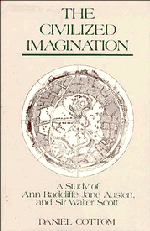Summary
Despite their differences in form, style, and theme, the works of Radcliffe, Austen, and Scott have important elements in common. They are concerned with the proper definition of nature, especially in regard to natural landscape, and with the tasteful judgment of nature and art. Moreover, in their works the nature of social forms takes on dramatic importance in the definition of civilization as well as in the more limited definition of decorum. In relation to this treatment of social forms, the authors explore the problem of disciplining desire, especially as they focus on the place of women in a patriarchal society. The battle of reason versus irrationality and the role of unconsciousness in the psychology of desire also appear as issues of great significance. Closely associated with these issues are the intertwined problems of defining mastery and regulating violence. In addition, one can see in the work of all three writers a marked difference between the narrative form they seek to assert and the contrary sense of things created by the dramatic events and descriptions within the novels.
Thus summarized, the similarities in the works of these writers may appear trivial. However, I hope to have shown that these and other relations among the works become highly significant when one analyzes the constructions of social order implicated in all their elements of representation.
- Type
- Chapter
- Information
- The Civilized ImaginationA Study of Ann Radcliffe, Jane Austen and Sir Walter Scott, pp. 193 - 202Publisher: Cambridge University PressPrint publication year: 1985



